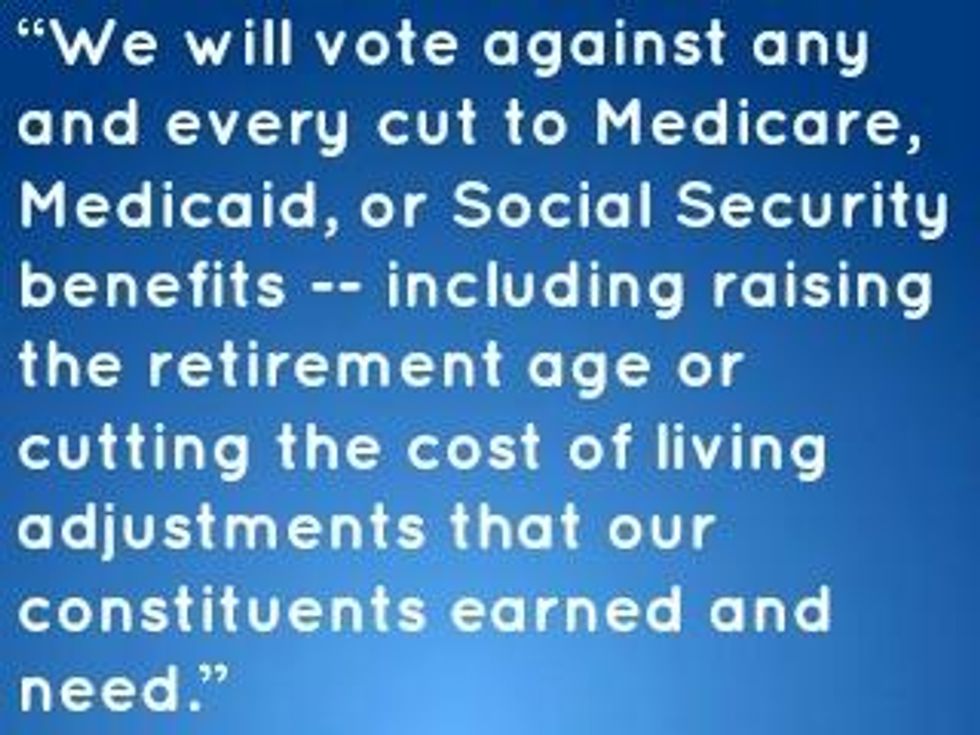Now we know.
Every member of Congress has chosen whether to sign a letter making a crucial commitment: "We will vote against any and every cut to Medicare, Medicaid, or Social Security benefits -- including raising the retirement age or cutting the cost of living adjustments that our constituents earned and need."
The Democratic Party hierarchy doesn't like the letter. House Democratic leader Nancy Pelosi has said that cutting Social Security would "strengthen" it, and President Obama's spokespeople keep emphasizing his eagerness to cut Social Security's cost of living adjustments. The fact that Social Security has nothing to do with the deficit is beside the austerity point.
Since mid-February, across the country, many thousands of people have sent personal notes, submitted petitions and made phone calls imploring members of Congress to sign the letter, initiated by Congressmen Alan Grayson and Mark Takano.
Twenty-eight members of the House of Representatives have signed the letter.
Here are their names: Brown, Cartwright, Castor, Clay, Conyers, D. Davis, DeFazio, Ellison, Faleomavaega, Grayson, G. Green, Grijalva, Gutierrez, A. Hastings, Honda, Kaptur, Lee, Lynch, C. Maloney, Markey, McGovern, Nadler, Napolitano, Nolan, Serrano, Takano, Velazquez and Waters.
If you don't see the name of your Congress member on that list, you live in a House district without a representative standing up for economic decency.
Especially noteworthy are 49 members of the House who belong to the Congressional Progressive Caucus but have refused to sign the Grayson-Takano letter. In most cases, they represent districts with a largely progressive electorate. In effect, their message is: We like to call ourselves "progressive" but we refuse to clearly stand up to an Obama White House that's pushing to slash Social Security and Medicare benefits. To see the names of those 49 members of Congress, click here.
A case in point: As a freshman Congressman, Jared Huffman represents California's North Coast district, stretching from the Golden Gate Bridge to the Oregon border. On the 2012 campaign trail, I often heard Huffman assuring voters that he opposed cuts to Social Security and Medicare. (As a candidate, I finished second to him among Democrats in the primary election last June.) When he got to Washington, Huffman joined the Progressive Caucus.
Now, refusing to sign the Grayson-Takano letter, Congressman Huffman publicly touts his disdain for "outside groups." Days ago, deriding the pressure from organizations urging him to sign the letter, Huffman boasted on his public Facebook page: "I won't be bullied from the left or the right into signing Norquistian vote pledges to outside groups."
The pejorative word "Norquistian" is proving to be very handy for some Democratic politicians--eager to equate progressive pledges not to cut vital social programs with right-wing pledges not to increase any taxes--as if standing up for economically vulnerable people is somehow comparable to the ideological rigidity of Grover Norquist. This amounts to old-wine corporate centrism poured into a new rhetorical bottle. Subtext: basic progressive principles aren't important enough to warrant a wiggle-proof promise.
As battles over key issues of economic fairness intensify on Capitol Hill, we're very likely to see a lot of Democrats--led by President Obama--preening themselves as virtuously non-dogmatic while they rebuff the minimal humanistic demands of progressive constituencies. The Grayson-Takano letter, for example, has been endorsed by dozens of progressive groups such as National Nurses United, Credo Action, MoveOn.org Civic Action, Bold Progressives, Democracy for America, RootsAction.org, Social Security Works, Progressive Democrats of America, the Strengthen Social Security Coalition, Rebuild the Dream, Progressives United, Color of Change, Campaign for America's Future, Center for Community Change, Latinos for a Secure Retirement, and the National Committee to Preserve Social Security and Medicare.
In the real politics of the emerging struggle over Social Security, Medicare and Medicaid, there's a very big difference between expressing opposition to benefit cuts and promising not to vote for them. It's only when members of Congress make a firm public commitment that Obama White House strategists may feel a need to recalibrate their deal-making calculus with Republicans.
Even firm commitments have eroded all too often on Capitol Hill, but at least the Grayson-Takano letter is a solid starting point. And as we look to the next election season, we should be searching for alternatives to the members of Congress who call themselves "progressive" but refuse to risk the wrath of an austerity-crazed Obama White House.




